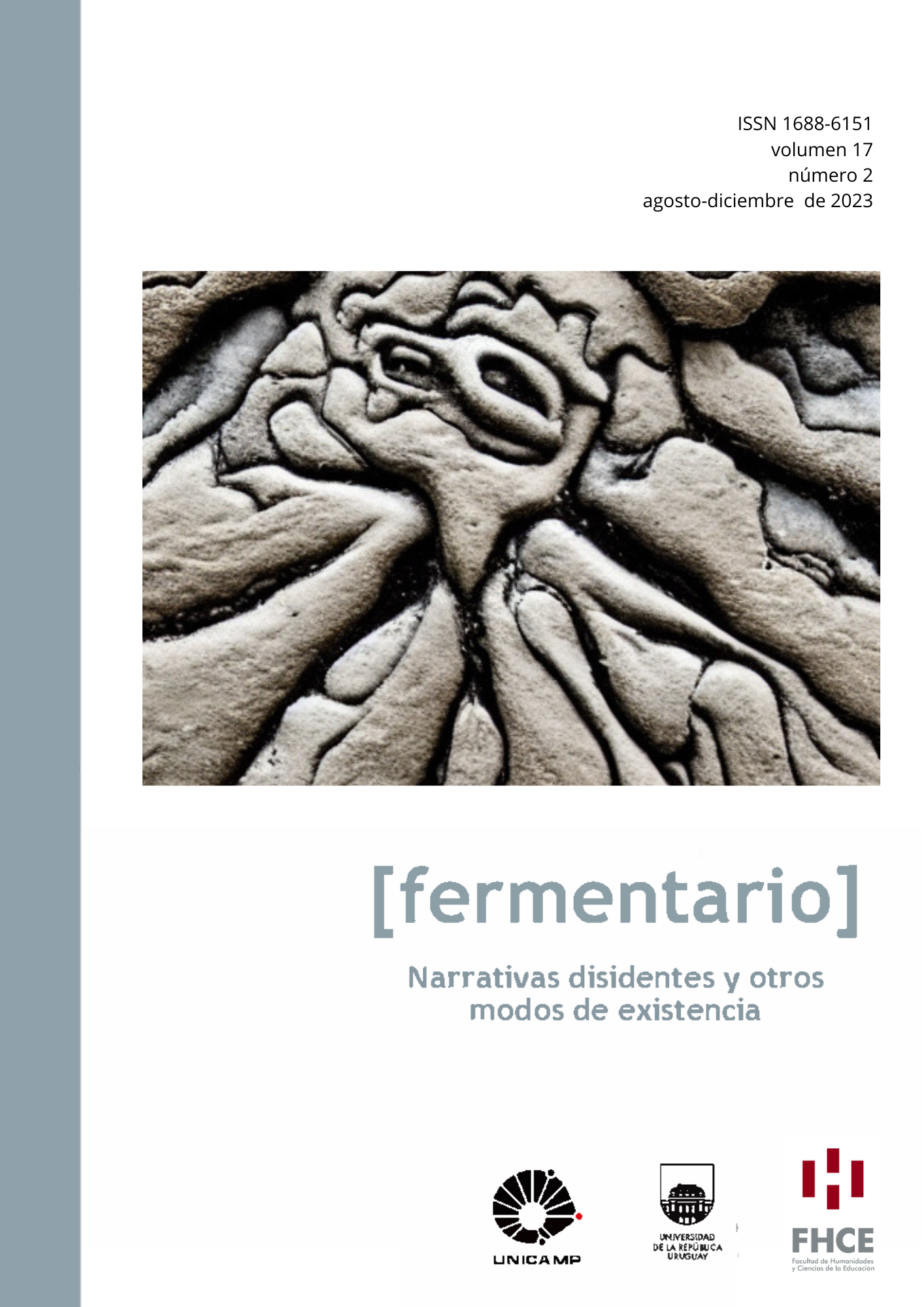Collective narratives. A proposal to rethink training in the School of Psychology
Published 2023-12-27
Keywords
- Autoficción,
- Formación,
- Narrativas colectivas
- Autoficção,
- Formação,
- Narrativas coletivas
- Autofiction,
- Collective narratives,
- Training
How to Cite
Abstract
This study intends to present a teaching experience in the School of Psychology, Universidad de la República. We took two courses of the Curriculum as a field of work: a compulsory one called Construction of Itineraries (CI) located in the fifth and sixth semesters of training and a project entitled “Collective Narratives. Listening and composition”, which was proposed for eighth semester students.
We set up one course after another to rehearse the realization of collective narratives as a way of approaching and thinking about the folds between personal, institutional, historical and social aspects, questioning pre-established discourses and seeking to stimulate collective processes that enable new ways of inhabiting the narratives that are produced about our institution, psychological practice and being students of Psychology. We inscribe our teaching practice in the Foucauldian sense of the epimeleia heautón, in the tensions between the linguistic turn and the affective turn, in a narrative and cartographic perspective, and from a sensitive listening as a producer of meanings perspective. We also include notions that mainstream our way of working: subjectivity, desire, education, analysis of implication. Finally, we rely on the concept of autofiction as a possibility of producing variations on the obvious clichéd narratives about being a psychology student and thus producing new meanings that question the linearity of time, the me/not me separation, the idea of a "faithful" memory, the border between reality and fiction and regimes of truth.
We conclude that thinking about education in Psychology from the perspective of collective narratives is very powerful as a method, consistent with the goals of the proposed courses and an important tool for the analysis of implication, a fundamental exercise in the practice of Psychology.
Downloads
References
- Ahmed, S. (2019). La promesa de la felicidad. Una crítica cultural al imperativo de la alegría. Buenos Aires: Caja
- Negra.
- Ardoino, J. (2005). Complejidad y formación: pensar la educación desde una mirada epistemológica. Buenos Aires:
- Centro de Publicaciones.
- Austin, J. (1962). Cómo hacer cosas con palabras. Buenos Aires: Paidós.
- Banfi, C. (2015). Musicoterapia. Acciones de un pensar estético. Buenos Aires: Lugar Editorial.
- Berardi, F. (2017). Fenomenología del fin. Sensibilidad y mutación conectiva. Buenos Aires: Caja Negra.
- Berlant, L. (2020). El optimismo cruel. Buenos Aires: Caja Negra.
- Blanco, S. (2018). Autoficción. Una ingeniería del yo. Madrid: Punto de Vista Editores.
- Butler, J. (2008). Cuerpos que importan. Buenos Aires: Paidós.
- Deleuze, G. (2002). Diferencia y repetición. Buenos Aires: Amorrortu.
- Deleuze. G. (2015). Foucault. Barcelona: Paidós.
- Deleuze, G., y Guattari, F. (2012). Mil mesetas: capitalismo y esquizofrenia. Valencia: Pre-Textos.
- Foucault, M. (1992). El orden del discurso. Buenos Aires: Tusquets.
- Foucault, M. (2009). La hermenéutica del sujeto. Curso del Collège de France (1982). Buenos Aires: Fondo de Cultura
- Económica.
- Gago, V. (2008, febrero 26). ¿Quién es y cómo piensa Bifo? Capitalismo y subjetividades. La Vaca. Recuperado de
- https://www.lavaca.org/notas/quien-es-y-como-piensa-bifo/
- Ibáñez, T. (1992). ¿Cómo se puede no ser construccionista hoy en día? Revista de Psicoterapia, III(12), 245-257.
- Lara, A., y Enciso, G. (2013). El Giro Afectivo. Athenea Digital, 13(3), 101-119.
- Lourau, R. (1991). Implicación y sobreimplicación. En «El Espacio Institucional. La dimensión institucional de las
- prácticas sociales», El Espacio Institucional, Buenos Aires.
- Macón, C. (2020). Lauren Berlant: el sonido, la furia (y los afectos). Latfem. Recuperado de https://latfem.org/laurenberlant-el-sonido-la-furia-y-los-afectos/
- Passos, E., Kastrup, V., y Da Escossia, L. (Orgs.). (2009). Pistas do método da cartografia: Pesquisa-intervenção e
- produção de subjetividade. Porto Alegre: Sulina.
- Rey, J., y Granese, A. (2018). La cartografía como método de investigación en psicología. Psicología, Conocimiento y
- Sociedad, 9(1), 1-34. http://dx.doi.org/10.26864/PCS.v9.n1.4
- Rorty, R. (1998). El giro lingüístico. Dificultades metafilosóficas de la filosofía lingüística. Barcelona: Paidós.
- Wittgenstein, L. (1999). Investigaciones filosóficas. Barcelona: Altaya


